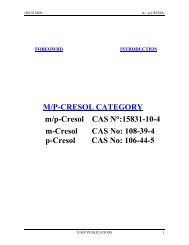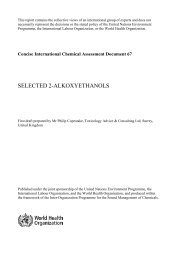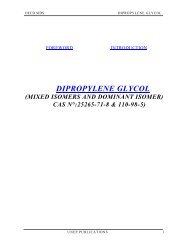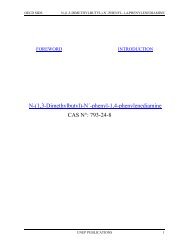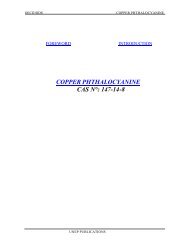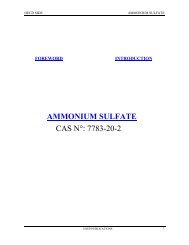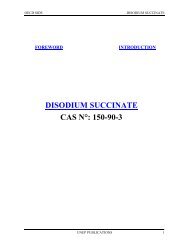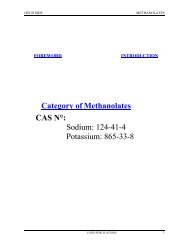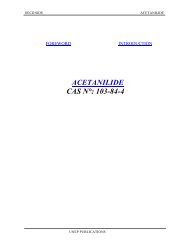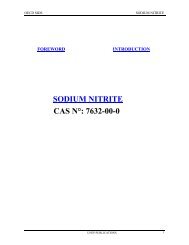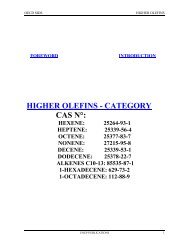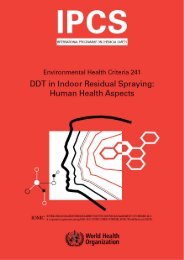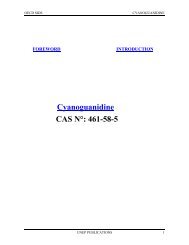POTASSIUM CHLORIDE CAS N°: 7447-40-7
POTASSIUM CHLORIDE CAS N°: 7447-40-7
POTASSIUM CHLORIDE CAS N°: 7447-40-7
Create successful ePaper yourself
Turn your PDF publications into a flip-book with our unique Google optimized e-Paper software.
OECD SIDS<br />
<strong>POTASSIUM</strong> CHLOR<br />
Date: 30-MAR-2003<br />
4. Ecotoxicity Substance ID: <strong>7447</strong>-<strong>40</strong>-7<br />
4.7 Biological Effects Monitoring<br />
Type:<br />
Remark:<br />
Animals<br />
Potassium and chloride are essential constituents<br />
and two of the most abundant ions in all animal<br />
species. The biological effects of action of these<br />
ions are well reviewed :<br />
K + is the principal cation mediating the osmotic<br />
balance of the body fluids. In animals, the<br />
maintenance of normal cell volume and pressure<br />
depends on Na + and K + pumping. Metabolic energy is<br />
expended in maintaining the gradient. In the<br />
absence of such pumping, chloride and sodium<br />
would enter the cells down their concentration<br />
gradients, and water would follow along the<br />
osmotic gradient thus created, causing the cells<br />
to swell until the pressure inside them balance<br />
the influx. Because sodium and potassium are<br />
actively transported, the osmolality of the cells<br />
remains the same as that of the interstitial<br />
fluid. The membrane potential is maintained, and<br />
the chloride concentration inside the cells<br />
remains low.<br />
The K + /Na + separation has allowed for evolution of<br />
reversible transmembrane electrical potentials<br />
essential for nerve and muscle action in animals.<br />
Potassium transport through the hydrofobic<br />
interior of a membrane can be facilitated by a<br />
number of natural compounds that form lipidsoluble<br />
alkali metal cation complexes. Potassium<br />
serves the critical role as counterion for various<br />
carboxylates, phosphates and sulphates, and<br />
stabilizes macromolecular structures.<br />
Source:<br />
Norsk Hydro ASA<br />
Reliability: (1) reliable without restrictions<br />
Flag:<br />
non confidential<br />
01-MAR-2001 (35)(61)<br />
Type:<br />
Remark:<br />
Plants<br />
Biological effects of potassium as one of the<br />
three major plant nutrients, and chloride as an<br />
essential micronutrient for plants, is well<br />
reviewed :<br />
An adequate K supply is necessary to ensure crop<br />
resistance to lodging, disease and drought. K is<br />
an important quality agent both through a direct<br />
effect on crops and because it strengthens<br />
resistance to diseases, and sufficient K is<br />
important for vitamin and mineral content, for<br />
texture, firmness and resistance to damage during<br />
transport.<br />
Potassium in plants is important for the osmotic<br />
and ionic regulation, and for a large number of<br />
enzymes related to carbohydrate and protein<br />
metabolism. In almost all cases, cytosolic<br />
potassium concentrations are maintained in the<br />
range 100-200 mM. Due to its high concentration<br />
UNEP PUBLICATIONS 59



